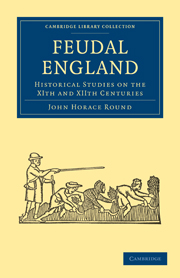Book contents
- Frontmatter
- Preface
- Contents
- PART I TERRITORIAL STUDIES
- PART II HISTORICAL STUDIES
- NORMANS UNDER EDWARD THE CONFESSOR
- MR. FREEMAN AND THE BATTLE OF HASTINGS
- MASTER WACE
- NOTE ON THE PSEUDO-INGULF
- REGENBALD, PRIEST AND CHANCELLOR
- THE CONQUEROR AT EXETER
- THE ALLEGED DESTRUCTION OF LEICESTER (1068)
- ELY AND HER DESPOILERS (1072–75)
- THE LORDS OF ARDRES
- EARLY IRISH TRADE WITH CHESTER AND ROUEN
- WALTER TIREL AND HIS WIFE
- WALDRIC, WARRIOR AND CHANCELLOR
- A CHARTER OF HENRY I. (1123)
- THE ORIGIN OF THE NEVILLES
- THE ALLEGED INVASION OF ENGLAND IN 1147
- THE ALLEGED DEBATE ON DANEGELD (1163)
- A GLIMPSE OF THE YOUNG KING'S COURT (1170)
- THE FIRST KNOWN FINE (1175)
- THE MONTMORENCY IMPOSTURE
- THE OXFORD DEBATE ON FOREIGN SERVICE (1197)
- RICHARD THE FIRSTS CHANGE OF SEAL (1198)
- COMMUNAL HOUSE DEMOLITION
- THE CINQUE PORT CHARTERS
- ADDENDA
- INDEX
MR. FREEMAN AND THE BATTLE OF HASTINGS
Published online by Cambridge University Press: 05 October 2010
- Frontmatter
- Preface
- Contents
- PART I TERRITORIAL STUDIES
- PART II HISTORICAL STUDIES
- NORMANS UNDER EDWARD THE CONFESSOR
- MR. FREEMAN AND THE BATTLE OF HASTINGS
- MASTER WACE
- NOTE ON THE PSEUDO-INGULF
- REGENBALD, PRIEST AND CHANCELLOR
- THE CONQUEROR AT EXETER
- THE ALLEGED DESTRUCTION OF LEICESTER (1068)
- ELY AND HER DESPOILERS (1072–75)
- THE LORDS OF ARDRES
- EARLY IRISH TRADE WITH CHESTER AND ROUEN
- WALTER TIREL AND HIS WIFE
- WALDRIC, WARRIOR AND CHANCELLOR
- A CHARTER OF HENRY I. (1123)
- THE ORIGIN OF THE NEVILLES
- THE ALLEGED INVASION OF ENGLAND IN 1147
- THE ALLEGED DEBATE ON DANEGELD (1163)
- A GLIMPSE OF THE YOUNG KING'S COURT (1170)
- THE FIRST KNOWN FINE (1175)
- THE MONTMORENCY IMPOSTURE
- THE OXFORD DEBATE ON FOREIGN SERVICE (1197)
- RICHARD THE FIRSTS CHANGE OF SEAL (1198)
- COMMUNAL HOUSE DEMOLITION
- THE CINQUE PORT CHARTERS
- ADDENDA
- INDEX
Summary
ἱσχυρός καθωπλισμένος φυλάσσῃ τὴν ἑαυτοῦ αὐλήν, ἐν εἰρήνῃ ἐστὶν τὰ ὑπάρχοντα αὐτοῦ. ἐπὰν δε ἰσχυρότερς αὐτοῦ ἐπελθὼν νικήσῃ αὐτόν, τὴν πανοπλίαν αὐτοῦ αῒρει ἐφ' ᾗ ἐπεποίθει.
IT might well be thought the height of rashness to attempt criticism, even in detail, of Mr. Freeman's narrative of the Battle of Hastings. For its story, as his champion has well observed, is “the centre and the very heart of Mr. Freeman's work: if he could blunder here in the most carefully elaborated passage of his whole history, he could blunder anywhere; his reputation for accuracy would be gone almost beyond hope of retrieving it.” And indeed, it may fairly be described as Mr. Freeman's greatest achievement, the point where he is strongest of all. He himself described the scene as the “battle which is the centre of my whole history,” and reminded us that
on its historic importance I need not dwell; it is the very subject of my history. … Looking also at the fight simply as a battle, it is one of the most memorable in all military history.
That is the first point. The second is, that in his battle pieces our author was always at his best. Essentially a concrete historian, objective as Macaulay in his treatment, he loved incident and action; loved them, indeed, so well, that he could scarcely bring himself to omit the smallest details of a skirmish:–
E ripenso le mobili
Tende, e i percossi valli,
E '1 campo dei manipoli,
E l'onda dei cavalli
- Type
- Chapter
- Information
- Feudal EnglandHistorical Studies on the XIth and XIIth Centuries, pp. 332 - 398Publisher: Cambridge University PressPrint publication year: 2010First published in: 1895



